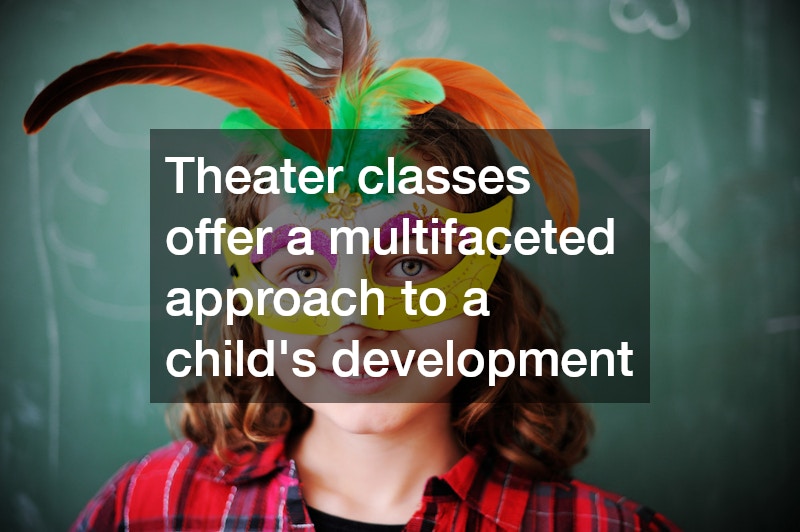
In recent years, enrolling children in theater classes has become an increasingly popular trend among parents and educators. This surge in interest highlights an evolving recognition of the performing arts not just as an extracurricular activity, but as a valuable component of child development. Understanding the myriad benefits associated with theater, from boosting confidence to enhancing social skills, can encourage more caregivers to consider this creative outlet for their children. If you’re considering looking up ” theater classes for kids near me,” read on.
1. Improving a Child’s Confidence
Self-Expression and Public Speaking
Theater provides a unique platform for children to express themselves freely and creatively. By participating in drama classes, young learners gain experience in front of audiences, helping them develop the ability to communicate effectively.
These skills are particularly valuable as they contribute to a child’s confidence in both academic and social settings.
Learning lines and performing scripts allow children to explore various forms of self-expression. This not only hones their public speaking skills but also helps them discover their unique voice and personality. Such experiences are instrumental in building a solid foundation of self-confidence, encouraging children to participate more actively in school and community events.
Overcoming Stage Fright
One of the prominent barriers many children face in public settings is stage fright. Theater classes incorporate specific techniques to help children manage this anxiety effectively. Regular exposure to stage performances gradually diminishes fears, empowering children to confront challenges with bravery.
Children learn breathing exercises, visualization techniques, and relaxation methods that are effective in calming nerves before a performance. Overcoming stage fright equips children with a significant life skill, enabling them to tackle intimidating situations with composure. Such experiences enhance a child’s ability to perform under pressure, preparing them for various real-world scenarios.
Moreover, the repetitive nature of performances instills a sense of comfort and familiarity with public speaking. Instructors play a crucial role by nurturing a safe environment where mistakes are viewed as opportunities for growth. With time, children come to view the stage not as a place of scrutiny, but as a platform for self-expression and achievement.
2. The Educational Benefits of Theater Classes
Enhancing Creativity and Imagination
Theater is a breeding ground for creative thinking and imaginative play. Children are encouraged to explore different roles, scenarios, and narratives, sparking their creativity and expanding their cognitive abilities. This stimulation of imagination is an essential ingredient in their overall intellectual development.
Engaging in improvisation exercises allows children to develop their ideas spontaneously. This fosters a unique problem-solving ability, as children learn to think on their feet and navigate unexpected situations. The arts also promote an open-minded attitude, encouraging children to consider diverse perspectives and solutions.
Critical Thinking and Problem Solving
Theater education challenges students to engage in critical analysis, a skill that is invaluable across academic disciplines. As children dissect scripts, characters, and narratives, they develop an understanding of complex themes and ideas. This analytical mindset fosters critical thinking, enabling children to make sense of a variety of contexts.
Moreover, theater presents numerous problem-solving opportunities, such as navigating stage directions and costume changes. These experiences require a child to think strategically and act resourcefully, skills that are vital in real-life situations. The collaborative nature of theater projects further emphasizes the importance of teamwork in solving complex tasks.
3. Social and Emotional Growth Through Theater
Building Empathy and Emotional Intelligence
Theater education offers unique opportunities to explore a range of emotions and human experiences, fostering empathy in young learners. By stepping into the shoes of different characters, children gain insights into diverse perspectives and emotions. This practice cultivates emotional intelligence, teaching children to understand and relate to others more effectively.
Through role-playing, children can experiment with expressing a multitude of feelings, developing a broad emotional repertoire. They learn to identify and articulate their own emotions, as well as recognize those of their peers. This ability enhances their social interactions, fostering stronger relationships both on and off the stage.
Strengthening Communication Skills
Theater serves as a rich platform for honing communication skills, both verbal and nonverbal. Children learn to convey nuances through voice modulation, facial expressions, and body language, enhancing their ability to express emotions clearly and effectively. This skill is crucial in delivering compelling performances and engaging in meaningful interactions.
Participating in dialogue-driven scenes teaches children the art of listening actively and responding thoughtfully. They develop the capacity to interpret and adapt to the cues of others, improving their conversational abilities. These skills are transferrable to various social and professional settings, facilitating successful communication endeavors.
In conclusion, theater classes offer a multifaceted approach to a child’s development, enhancing confidence, creativity, and social skills. Lessons in self-expression, empathy, and collaboration prepare children for a variety of life situations, equipping them with essential skills for their personal and academic growth. The benefits of enrolling children in theater are far-reaching and impactful, fostering a lifelong love for learning and personal development.
.



